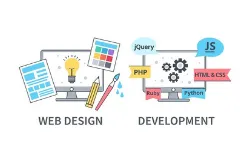Importance of NoSQL Databases
Understanding NoSQL Databases
Before tackling why a NoSQL database is beneficial and its features, first we need to understand what lies behind this technology by knowing its concepts. In contrast to the traditional relational databases that have a yardstick schema and are manipulated by the structured query language (SQL), NoSQL databases adopt the free format and can be flexiblely modeled into a wide variety of data formats. Due to the great variations it offers, they can be used in Gartner representing documents, graphs, key-value pairs, and wide column stores. At Apponix Academy, as we realize the significant contribution that NoSQL databases make to the environment of data management, we steadily conduct open courses on main NoSQL database concepts for people to learn and be successful in mastering these databases.
Importance of NoSQL Databases
Scalability: The initial reason for implementing NoSQL databases is their capability to handle horizontally, scaling without hassle when the amount of data and users is bigger. The advancements in web and mobile apps that now provide unprecedented development have made scalability a routine process.
Flexibility: While a traditional relational database expects rigid schemas where the design must be completed upfront and the data structure is known in advanced, a NoSQL data store doesn't have such restrictions. Unlike relational databases, NoSQL databases do not stick to a predefined schema that means developers can take advantage of the feature and build on the fly, conforming to the evolving application demands.
Adaptability: This adaptability is the most important asset for agile developers in the agile development organized environments as the changes are constant and agile development refers to an iterative process.
High Performance: NoSQL databases are made for distinct purposes, showcasing their efficiency compared to their relational predecessors in specific cases. It doesn't matter whether you need a database to handle real-time analytics, streaming data, or high-throughput transaction processing, a NoSQL database will give you the capability to process and display data at an amazing speed.
Fault Tolerance: The sole purpose of NoSQL databases is to design fault tolerance systems by employing various distributed aggregation networks and replication techniques for data durability and accessibility. This redundancy in the data assists the NoSQL databases in avoiding data loss and downtime by means of fail-over and other similar mechanisms.
Benefits of using NoSQL Databases
Enhanced Developer Productivity: Whereas, in an SQL database, the developer will have to spend more time wrestling with schemas and rigid data models, the NoSQL database enables him to work on the important functions instead of the features.
Cost-effectiveness: NoSQL databases provide an operative solution for the issue of handling huge amounts of data at some costs without any unpredictability, which is also a block for relational databases. More organizations can do this because of using commodity hardware and open-source software.
Support for Polyglot Persistence: It is a very common thing to apply applications in the world consisting of multi-platform and multi-device via which applications need to support multiple data types and access levels. NoSQL databases, based on the notions of polyglot persistence, empower companies by making it possible to determine the appropriate database for the specific class of workloads.
Learning NoSQL Database at Apponix Academy.
Our comprehensive curriculum covers the following key areas:
Introduction to NoSQL Databases: Catch up with the core concepts of NoSQL databases, that is, data modeling, query languages, and distributed architecture.
MongoDB Essentials: Get proficient in MongoDB, the number one document-tailored NoSQL database, and discover how to craft, implement, and maintain MongoDB clusters for the scale and swift needs of contemporary applications.
Apache Cassandra Fundamentals: Delineate Apache Cassandra, a distributed wide-column NoSQL database that possesses high fault tolerance, scalability, and linear performance as compared to other databases. Know data modeling methods, performance tuning, and correctness of the data among other crucial lessons in Cassandra clusters.
Neo4j Graph Database: Ignite the performance of Neo4j, a graph database, which is a robust and scalable graph database best suited for the graph querying and analysis of highly interconnected data. Practice an ability to model and query complex relationships using Cypher, a system technique for querying in Neo4j.
NoSQL technology stands tall as a paradigm-changing data management approach, which, above all else, ensures unprecedented scalability, flexibility and performance for 21st-century-era applications. We at Apponix Academy, can train the learners and help them acquire the required skills and become relevant in today's data-driven world. Rather than settle for the traditional SQL instruction, our NoSQL databases courses will enable you to embark on a self-discovery and distinguished journey where modern data management possibilities are unlocked and application development is redefined.
Grasp all the potential of NoSQL databases, upgrade your skills, and make your career go ever higher by enrolling in Apponix Academy.
Most Popular Courses
JAVA Programming | Java Full Stack development







